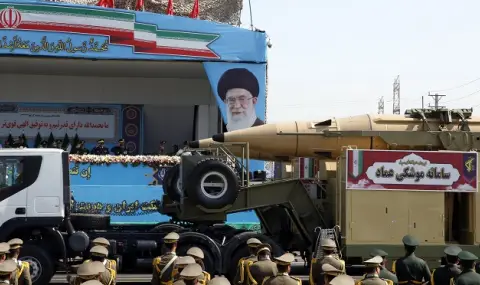Iran has never was part of the solution to the crisis in the Middle East, and is the cause of the crisis itself. Until Iran fundamentally changes, there can be no peace in the region. This is what Joshua Zarka, ambassador of the State of Israel in Paris and an expert on the Iranian file, said in an interview with the French daily Le Figaro.
LE FIGARO: What are the consequences of Nasrallah's death for Israel
JOSHUA ZARKA: She completely shuffled the cards. Until then, there was restraint between Israel and Hezbollah. We feared a war against Hezbollah and tried to find diplomatic solutions. Today we have destroyed between 60% and 80% of its military capacity. She is no longer the ultimate "proxy" of Iran. Nasrallah represented the struggle against Israel. To all who want our country destroyed, he was a hero. By losing it, Iran lost its main deterrent against Israel. We need to understand that Iran is our main problem. All threats against Israel are related to it: terrorist, conventional, nuclear. The "proxy" of Iran in the region has allowed it to wage war against us from afar without engaging directly. It fell to pieces today. Neither Hamas, nor the Houthis, nor Hezbollah will be able to dissuade us anymore.
LE FIGARO: Do you want to destroy Hezbollah like you wanted to destroy Hamas?
J. ZARKA: Hezbollah will lose its ability to hurt us militarily. But it won't go away because it's an ideology. Until Iran fundamentally changes, there will be no peace in the Middle East. Because his goal is to reshape the region through force and terrorism. After the war, the Iranians resumed funding and rearming Hezbollah.
LE FIGARO: Is there room for a positive scenario in Lebanon? One that would allow the country to shake off Iranian influence and take control of its own destiny?
J. ZARKA: Yes, it is doable. But the international community will really have to deal with this, stop doing things by halves and make it clear that Iran is an enemy of Lebanon and stability. So far I have not heard international leaders admit that Iran is at the root of the problem.
LE FIGARO: Does Benjamin Netanyahu have a strategy, a vision for the region, or does he only care about staying in power?
J. ZARKA: He has a strategy, it is very simple and it has never changed. It is about building the conditions that will lead to sustainable peace between us and our neighbors. But after October 7, in order to achieve this goal, we had to go through a period of war, because the "proxy" of Iran believe that Israel should disappear. We have no intention of disappearing. Therefore, our goal is to weaken them sufficiently so that they are unable to threaten the peace.
LE FIGARO: How long do you think you can weaken them before they recover?
J. ZARKA: Again, it depends on the international community. She has long believed that Iran is part of the solution. Since Iran helped Russia in its war against Ukraine, this is no longer the case. But we will have to work together to prevent Iran from restoring its "proxies".
LE FIGARO: Will Israel launch a ground offensive in southern Lebanon?
J. ZARKA: It's possible. If Hezbollah finally complies with UN Security Council Resolution 1701, which orders it to withdraw its forces beyond the Litani River, it will be difficult for us to continue. Otherwise...
LE FIGARO: What do you think of the calls for a ceasefire made, in particular by the United States and France, at the UN?
J. ZARKA: No country can afford to be attacked without responding. Since we pulled out in 2005, more than 200,000 rockets have been fired at us from Gaza. Since October 8, at least 9,000 shots have been fired from South Lebanon at us. Imagine France's reaction if missiles were fired at it from Luxembourg... We are only defending ourselves to avoid a future war. War is terrible, but it is forced upon us. The Palestinian people are the ones who suffer the most, but they are exploited by Hamas, Hezbollah, Iran and some political actors in Western countries. There is a very simple way to achieve a ceasefire with Hamas: the release of the hostages.
LE FIGARO: How do you imagine the future of Gaza?
J. ZARKA: It's up to the Palestinians to decide. We have set two conditions: peace with Hamas cannot be concluded. Can one then be concluded with the Palestinian Authority? Only if it is reformed. But we haven't reached that stage yet.
LE FIGARO: Does the Israeli government want to annex the West Bank?
J. ZARKA: Some in power, yes. But this is not the position of the government.
LE FIGARO: Do you still believe in the UN?
J. ZARKA: For a long time it was an organization that guaranteed a certain peace. But today she doesn't even have that role anymore. This is undoubtedly due in part to the way it is managed. She cannot choose between good and evil. UN language cannot designate terrorist organizations. This is ridiculous. It took her months to speak out about the sexual violence committed by Hamas against Israeli women after October 7. In short, this is a player who does not help maintain international stability.
LE FIGARO: On October 7, the Israeli security services failed. Today they carry out spectacular operations in Iran and southern Lebanon. How did they achieve this result in just one year?
J. ZARKA: Actually, these abilities already existed a year ago. Two things led to October 7th. First, the arrogance of some of our military leaders towards Hamas. Second, the fact that we had directed all our efforts against our main enemies - Hezbollah and Iran.
